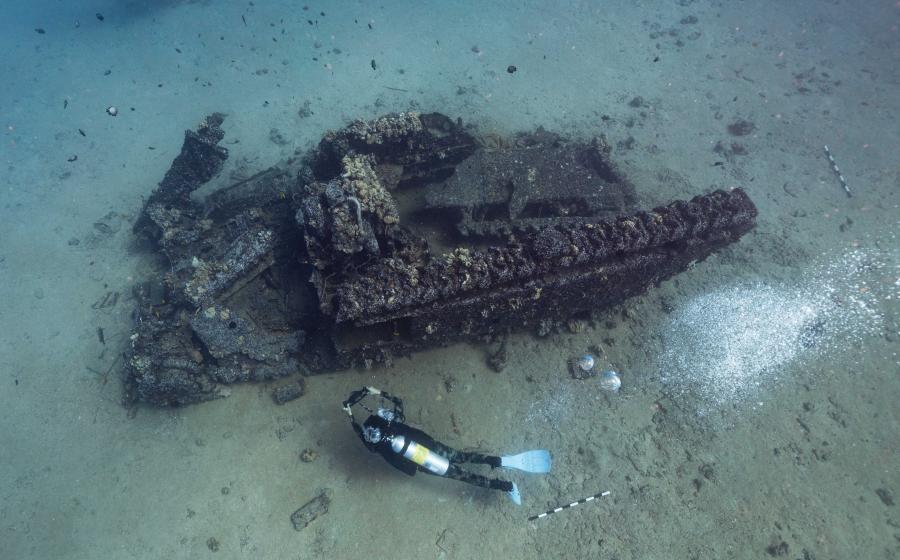Are You Medically Fit To Dive
April 2001
By John Francis
Are you medically fit to dive? That's a complicated question that only you and your doctor can answer, but the physical and environmental demands of diving require these basics:
Healthy Lungs
The first requirement for safe diving is a healthy set of lungs. They must work adequately even with the increased work of breathing created by your regulator and dense compressed air. In addition to their usual job--extracting oxygen when you inhale and eliminating carbon dioxide when you exhale--the lungs also eliminate dissolved nitrogen from your bloodstream, preventing decompression sickness (DCS).
Because the lungs deal with expanding and contracting volumes of gas, they are most at risk for barotrauma. Even a small amount of air trapped in the lungs can expand on ascent, rupturing the lung and causing life-threatening embolisms.
Can I Dive With ...
Asthma: Probably not a good idea if the attacks are induced by exercise or by breathing cold air. When the asthma is triggered by other causes, many doctors now say that asthmatics whose attacks are well-controlled by medication, and who have normal lung function between attacks, may dive.
Other lung diseases and injuries: Chronic bronchitis, pneumothorax (collapsed lung), chronic obstructive pulmonary disease and emphysema can diminish lung capacity and increase the odds of air-trapping. The risk is too great.
A Clear Head
You've got to stay conscious--no chance of impaired consciousness or sudden seizure--and you've got to be calm and rational.
Can I Dive With ...
Mental Illness: Obviously, a full-blown psychotic should not dive because of his unstable reaction to a crisis. Even though his disease may be well-controlled by medication, many psychotropic drugs add to the effect of nitrogen narcosis. And although psychoses may go into remission, leaving the person apparently normal and able to dive, the disorder may flare up unexpectedly.
Migraine headaches: It's an individual decision, but in most cases you can dive safely. However, higher partial pressures of carbon dioxide, which could occur at depth, tend to bring on a migraine, which can be confused as a symptom of DCI. By the way, recent research shows that those who experience an aura with their migraine are unusually likely to have a PFO.
Epilepsy: Sudden onset of seizures or loss of consciousness presents a great danger of drowning or embolism, and the higher partial pressure of oxygen at depth may itself trigger seizures. Epilepsy can be controlled with medication; however, it is unknown how the mild sedative effect might combine with nitrogen narcosis. For these reasons, the general advice is that if you've been seizure-free, without medication, for five years, you may dive--while keeping in mind the risks.
A Healthy Heart
Heart attacks and other circulatory problems are likely the leading cause of death while scuba diving. We think of diving as a low-stress activity, but swimming against a strong current, for example, can place peak demands on the heart. Heavy and constricting equipment, cold and anxiety all contribute to cardiac stress and may trigger a heart attack in a diver with hidden coronary disease.
Your doctor can measure your cardiovascular fitness with a treadmill stress test. Swimming in full scuba gear at only one knot (about 1.2 mph) is equivalent to a full-speed run on a treadmill, or roughly 13 "mets" (one "met" is your oxygen consumption at rest). You should be capable of reaching 13 mets without chest pain or shortness of breath.
A rough, do-it-yourself guide is this: Can you walk a mile in 12 minutes without heavy breathing?
Can I Dive With ...
Hypertension: High blood pressure is often an early warning of severe problems, such as coronary artery disease, which could disqualify you from diving. But if you are free from other diseases, and your hypertension is controlled by diet or medication, you can dive safely. If you require medication, the question is how the drug reacts at depth. In general, ACE inhibitors and beta-blockers in moderate doses do not seem to be a problem, though large doses of beta-blockers limit your cardiac ability to respond to exercise or stress.
Prior heart surgery: Those with coronary bypass surgery, angioplasty or stent insertion may dive safely if they have fully recovered, have normal blood flow and can pass a stress test without chest pain, shortness of breath or changes on the electrocardiogram. Pacemakers must also be tested and approved for depth.
Patent Foramen Ovale: This minor heart defect, found in 10 to 25 percent of the population, allows some venous blood to enter the arterial side of the heart, bypassing the lungs. In divers, this can allow some nitrogen bubbles to remain in the body and increases the risk of DCS and arterial gas embolism. The risk for most divers appears very small, but PFO could explain some "undeserved hits." If you have reason to suspect PFO, ask your doctor for a bubble contrast echocardiography, a test that can detect a PFO.
Healthy Ears
An inability to equalize or "clear" the ears and sinuses is the most common medical complaint in diving, and middle-ear barotrauma is usually the result.
Can I Dive With ...
Recent ear infections: If you've had infections in your middle ear or drainage in the last three years, you may have partially blocked eustachian tubes and may be at greater risk of middle-ear barotrauma. Get clearance from a dive-knowledgeable physician, preferably an ear, nose and throat specialist, before diving.
Past ear surgery: Surgery may also leave those tubes partially blocked. Some surgeries like radical mastoidectomy and inner-ear operations leave those structures more vulnerable to pressure damage. Again, seek clearance from your doctor first.
Malformed eustachian tubes: Some people have eustachian tubes that don't permit equalization. The condition can usually be corrected by surgery, but until it is, they can't dive.
Ruptured eardrum or other barotrauma: Once it has healed completely and if you can clear your ears well, you can dive.
Appropriate Leg, Arm and Torso Strength
The weightless feeling of diving causes many of us to overlook the physical stress on our bones and muscles caused by handling gear out of the water. You need enough leg strength to swim through a medium that's 800 times denser than air, plus enough arm and torso strength to handle tanks, weights and gear without fatigue or injury.
Can I Dive With ...
Herniated disc: Generally, divers with this common injury can dive if they have no permanent physical or neurological handicap as a result. They need to be very careful about lifting weights and tanks, climbing boat ladders, etc.
Back surgery: If surgery has been performed near the spinal cord, there may be an increased risk of spinal DCI. Current medical opinion does not, however, disqualify these people from diving if they have made a full recovery.
Physical Disabilities: In many cases, yes. Paraplegics, amputees and handicapped divers can all dive safely with proper training, gear modifications and, in some cases, assistance. For more information, contact the Handicapped Scuba Association (949) 498-4540.
April 2001
By John Francis
Are you medically fit to dive? That's a complicated question that only you and your doctor can answer, but the physical and environmental demands of diving require these basics:
Healthy Lungs
The first requirement for safe diving is a healthy set of lungs. They must work adequately even with the increased work of breathing created by your regulator and dense compressed air. In addition to their usual job--extracting oxygen when you inhale and eliminating carbon dioxide when you exhale--the lungs also eliminate dissolved nitrogen from your bloodstream, preventing decompression sickness (DCS).
Because the lungs deal with expanding and contracting volumes of gas, they are most at risk for barotrauma. Even a small amount of air trapped in the lungs can expand on ascent, rupturing the lung and causing life-threatening embolisms.
Can I Dive With ...
Asthma: Probably not a good idea if the attacks are induced by exercise or by breathing cold air. When the asthma is triggered by other causes, many doctors now say that asthmatics whose attacks are well-controlled by medication, and who have normal lung function between attacks, may dive.
Other lung diseases and injuries: Chronic bronchitis, pneumothorax (collapsed lung), chronic obstructive pulmonary disease and emphysema can diminish lung capacity and increase the odds of air-trapping. The risk is too great.
A Clear Head
You've got to stay conscious--no chance of impaired consciousness or sudden seizure--and you've got to be calm and rational.
Can I Dive With ...
Mental Illness: Obviously, a full-blown psychotic should not dive because of his unstable reaction to a crisis. Even though his disease may be well-controlled by medication, many psychotropic drugs add to the effect of nitrogen narcosis. And although psychoses may go into remission, leaving the person apparently normal and able to dive, the disorder may flare up unexpectedly.
Migraine headaches: It's an individual decision, but in most cases you can dive safely. However, higher partial pressures of carbon dioxide, which could occur at depth, tend to bring on a migraine, which can be confused as a symptom of DCI. By the way, recent research shows that those who experience an aura with their migraine are unusually likely to have a PFO.
Epilepsy: Sudden onset of seizures or loss of consciousness presents a great danger of drowning or embolism, and the higher partial pressure of oxygen at depth may itself trigger seizures. Epilepsy can be controlled with medication; however, it is unknown how the mild sedative effect might combine with nitrogen narcosis. For these reasons, the general advice is that if you've been seizure-free, without medication, for five years, you may dive--while keeping in mind the risks.
A Healthy Heart
Heart attacks and other circulatory problems are likely the leading cause of death while scuba diving. We think of diving as a low-stress activity, but swimming against a strong current, for example, can place peak demands on the heart. Heavy and constricting equipment, cold and anxiety all contribute to cardiac stress and may trigger a heart attack in a diver with hidden coronary disease.
Your doctor can measure your cardiovascular fitness with a treadmill stress test. Swimming in full scuba gear at only one knot (about 1.2 mph) is equivalent to a full-speed run on a treadmill, or roughly 13 "mets" (one "met" is your oxygen consumption at rest). You should be capable of reaching 13 mets without chest pain or shortness of breath.
A rough, do-it-yourself guide is this: Can you walk a mile in 12 minutes without heavy breathing?
Can I Dive With ...
Hypertension: High blood pressure is often an early warning of severe problems, such as coronary artery disease, which could disqualify you from diving. But if you are free from other diseases, and your hypertension is controlled by diet or medication, you can dive safely. If you require medication, the question is how the drug reacts at depth. In general, ACE inhibitors and beta-blockers in moderate doses do not seem to be a problem, though large doses of beta-blockers limit your cardiac ability to respond to exercise or stress.
Prior heart surgery: Those with coronary bypass surgery, angioplasty or stent insertion may dive safely if they have fully recovered, have normal blood flow and can pass a stress test without chest pain, shortness of breath or changes on the electrocardiogram. Pacemakers must also be tested and approved for depth.
Patent Foramen Ovale: This minor heart defect, found in 10 to 25 percent of the population, allows some venous blood to enter the arterial side of the heart, bypassing the lungs. In divers, this can allow some nitrogen bubbles to remain in the body and increases the risk of DCS and arterial gas embolism. The risk for most divers appears very small, but PFO could explain some "undeserved hits." If you have reason to suspect PFO, ask your doctor for a bubble contrast echocardiography, a test that can detect a PFO.
Healthy Ears
An inability to equalize or "clear" the ears and sinuses is the most common medical complaint in diving, and middle-ear barotrauma is usually the result.
Can I Dive With ...
Recent ear infections: If you've had infections in your middle ear or drainage in the last three years, you may have partially blocked eustachian tubes and may be at greater risk of middle-ear barotrauma. Get clearance from a dive-knowledgeable physician, preferably an ear, nose and throat specialist, before diving.
Past ear surgery: Surgery may also leave those tubes partially blocked. Some surgeries like radical mastoidectomy and inner-ear operations leave those structures more vulnerable to pressure damage. Again, seek clearance from your doctor first.
Malformed eustachian tubes: Some people have eustachian tubes that don't permit equalization. The condition can usually be corrected by surgery, but until it is, they can't dive.
Ruptured eardrum or other barotrauma: Once it has healed completely and if you can clear your ears well, you can dive.
Appropriate Leg, Arm and Torso Strength
The weightless feeling of diving causes many of us to overlook the physical stress on our bones and muscles caused by handling gear out of the water. You need enough leg strength to swim through a medium that's 800 times denser than air, plus enough arm and torso strength to handle tanks, weights and gear without fatigue or injury.
Can I Dive With ...
Herniated disc: Generally, divers with this common injury can dive if they have no permanent physical or neurological handicap as a result. They need to be very careful about lifting weights and tanks, climbing boat ladders, etc.
Back surgery: If surgery has been performed near the spinal cord, there may be an increased risk of spinal DCI. Current medical opinion does not, however, disqualify these people from diving if they have made a full recovery.
Physical Disabilities: In many cases, yes. Paraplegics, amputees and handicapped divers can all dive safely with proper training, gear modifications and, in some cases, assistance. For more information, contact the Handicapped Scuba Association (949) 498-4540.






